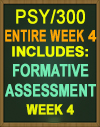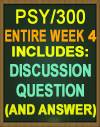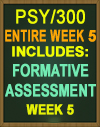PSY/300 General Psychology |
|
Or you may purchase tutorials by the Week below.
|
|
|
|
|
PSY/300 Week 1
Everything Listed for Week 1 is included in Tutorial purchase!
Wk 1 Individual: Research on Drug Use Presentation
Includes Presentation #1 with full Speaker Notes
Includes Presentation #2 with full Speaker Notes
Different types of drugs affect the body and mind in different ways. In psychology, it is important to understand why people may use drugs, and how individuals can study the behavior associated with drug use. In this assignment, you will identify and describe common psychological effects of various drug categories, as well as identify important aspects of conducting psychological research.
Imagine you’ve been asked to study human behavior in relation to the use of 2 different categories of drugs. You have been asked to present on how you plan to conduct your research, as well as the psychological effects of the drugs.
Choose 2 categories of drugs from the following:
• Stimulants
• Hallucinogens
• Depressants
• Opiates
• Marijuana
Create a 6- to 12-slide presentation with detailed speaker notes to show how you would conduct your research. Include:
• A description of the research method(s) that you would use.
• An explanation of the APA ethical guidelines that you would need to consider while conducting your
research.
• A description of the physical and psychological effects of each of the categories of drugs that you chose,
including a minimum of 2 drugs that fall under each category.
• An explanation of which approach to studying psychology you would use as a basis for understanding human
behavior related to using these drugs.
Format any citations in your presentation according to APA guidelines.
Submit your assignment.
Week 1 Formative Assessment (includes Answers)! A+ Work!
Test Content
- J. B. Watson and B. F. Skinner believed that
- Which of the following is true of opiates?
- In which of the following psychological approaches did researchers ask participants to think about what was going on mentally as various events took place?
- Sonja believes that the pill prescribed to her by the doctor has cured her of anxiety disorder. However, the pill contains no active ingredients. Sonja's belief that she is better now is an example of the ________ effect.
- Brett takes a drug that increases his feeling of euphoria. The drug also enhances his level of activity and pleasurable feelings. Which of the following drugs did he most likely take?
- ________ believed that psychology should be about what people do, and should not concern itself with what cannot be seen, such as thoughts, feelings, and goals.
- Brian conducts a study to examine the ability of boys and girls in solving difficult mathematical problems. He expects girls to perform much better than boys and communicates his expectation to the participants in a subtle manner. This is an example of
- ________ refers to the soundness of the conclusions that a researcher draws from an experiment.
- Dr. Steinguard wants to demonstrate a cause-and-effect relationship between stress and memory. Which of the following research methods should he use?
- Nicotine raises ________ levels in the brain.
- ________ involves using introspection to investigate the components of the mind, whereas ________ involves the functions or purposes of the mind and behavior in the individual's adaptation to the environment.
- Depressants ________, whereas stimulants ________.
- The humanistic approach to psychology and the behavioral approach to psychology differ in that the behavioral approach states that humans are driven by
- Psychologists who adopt a(n) ________ approach examine behavior and mental processes by focusing on the body, especially the brain and nervous system.
- Olivia, a research student, wants to determine the effect of alcoholism on domestic violence as part of her thesis paper. She realizes that informing the participants of her study about its exact nature will affect the results. The participants are likely to feel ashamed of openly discussing such sensitive issues. In this scenario, which of the following would be the best approach for Olivia?
|
|
|
|
|
|
PSY/300 Week 2
Everything Listed for Week 2 is included in Tutorial purchase!
PSY/300 Wk 2 Individual: Learning and Development Worksheet
For this assignment, you take a close look at the similarities and differences between classical and operant conditioning and the stages of human development.
Complete the Learning and Development Worksheet
Submit your assignment.
Types of Learning
Respond to the following prompts in 100 to 175 words each.
- Create an example of classical conditioning. Identify the unconditioned stimulus, unconditioned response, conditioned stimulus, and conditioned response. Explain how these elements work together to create classical conditioning.
- Create an example of operant conditioning. Explain how your example is operant conditioning by identifying the desired behavior, undesired behavior, and how you would use the elements of operant conditioning (positive reinforcement, negative reinforcement, positive punishment, and negative punishment) to produce the desired response.
- Explain the main similarities and differences between classical and operant conditioning in regard to how they produce learning.
Stages of Development
Complete the following table on the stages of development by describing the type of development that is occurring in each of the 3 developmental domains, during each of the developmental periods. Be sure to identify the appropriate stages of development as well (e.g., in the adolescence developmental period, individuals would be in the “Ego Identity vs. Role Confusion” stage for socioemotional development). Some domains may include more than one stage in a developmental period. Make notes on any additional development as applicable in the Other Types of Development column.
Week 2 Formative Assessment (includes Answers)! A+ Work!
Test Content
- Sammy is in third grade. When he won the spelling bee, he felt proud of his accomplishment. But when he could not complete his arithmetic assignment on time, he felt incompetent. Which of Erikson's psychosocial development stages is exemplified in this scenario?
- A mother 3-year-old and her 4-year-old children chocolate milk in identically shaped glasses to avoid conflict over who has more. The mother is showing her awareness of her children's difficulty with the concept of
- The removal of a stimulus following a given behavior in order to increase the frequency of that behavior is called
- Jennifer accidentally plays a radio channel that she has never heard before. She loves the music it plays and as a result, she starts playing only that channel whenever she wants to listen to music. In the context of operant conditioning, Jennifer's behavior has most likely been learned through
- Which of the following is the final stage of Erikson's psychosocial development?
- You tried to play peek-a-boo with your 1-month-old nephew, but whenever you hid your face, he would cry. You try it again 6 months later, and now he laughs and enjoys the game, trying to uncover your face with his hands. Your nephew has begun to develop
- Which of the following is true of a fixed-ratio schedule in operant conditioning?
- In Pavlov's classic study on classical conditioning, the bell was a ________ before conditioning and became a(n) ________ after conditioning had occurred.
- According to Thorndike's law of effect,
- Sarah feels sick every time she travels by air. She associates flying with physical illness and, as a result, hates air travel. She also finds it difficult to watch movies with airplanes or read books about airplanes because they make her uncomfortable. This scenario illustrates the learning process of
- In operant conditioning, ________ refers to rewarding successive approximations of a desired behavior.
- Liam is studying in his room for an exam but is disturbed by the loud music from his neighbor's house. He closes the window so that he can no longer hear the loud music. In this scenario, Liam's behavior demonstrates ________ in operant conditioning.
- When Justin, a teenager, told his parents that he wanted to learn an extracurricular activity, his parents gave him the liberty to choose any activity of his choice. However, they restricted him from choosing extreme sports. In this scenario, Justin's parents are following the ________ parenting style.
- Children of authoritative parents tend to
- Yuna, a toddler, undergoes toilet training. After a week of staying dry overnight, she experiences self-control and feels confident. In the context of Erikson's psychosocial development stages, Yuna is in the "________" stage.
Week 2 Discussion Question
Respond to the following in a minimum of 175 words:
Discuss the following: Is there a time in your life when you used the elements of operant conditioning? How did you use these elements? Did you get the desired results? What would you do differently?
|
|
|
|
|
PSY/300 Week 3
Everything Listed for Week 3 is included in Tutorial purchase!
Week 3 Formative Assessment (includes Answers)! A+ Work!
Test Content
- When individuals engage in a behavior because they enjoy it, they
- According to Rogers, an individual's need to be liked, loved, and accepted by others regardless of his or her behavior is called
- Which of the following is true of the trait theories of personality?
- Which of the following is defined as the motivation to develop one's full potential as a human being?
- The big five factors of personality are neuroticism, extraversion, openness to experience, agreeableness, and
- According to Freud, the ________ operates according to the pleasure principle, whereas the ________ operates according to the reality principle.
- According to drive reduction theory, the goal of drive reduction is
- According to Sigmund Freud's psychosexual stages of personality development, who among the following is in the oral stage?
- ________ is a pattern of enduring, distinctive thoughts, emotions, and behaviors that characterize the way an individual adapts to the world.
- Nelly's friends attempt to convince her to try cocaine at a party. Even though Nelly is tempted, she resists because she knows that the consequences of her actions would be disastrous for her body. In the context of Freud's structures of personality, Nelly's temptation to take cocaine is most likely dictated by her ________. Her decision not to take the drug is most likely dictated by her ________.
- Self-efficacy refers to
- ________ pertains to a psychological state, whereas ________ involves a physiological state.
- Which of the following perspectives emphasizes that personality is primarily unconscious?
- Which of the following terms refers to the strategies that the ego uses to reduce anxiety by unconsciously distorting reality?
- According to Maslow's hierarchy of needs theory, before a person can feel safe, he needs
Week 3 Discussion Question
Respond to the following in a minimum of 175 words:
Discuss the theories of motivation. Which theory do you think is most relevant in society today? Why? What is the role of intrinsic and extrinsic motivation in society?
|
|
|
|
|
PSY/300 Week 4
Everything Listed for Week 4 is included in Tutorial purchase!
Psychological Disorders Research Paper
In this assignment, you examine symptoms and treatment options for psychological disorders.
Write a 1,400- to 1,750-word paper in which analyze a particular psychological disorder, and ensure you:
- Select a psychological disorder, and explain your choice.
- Provide a detailed description of the disorder,including diagnostic criteria, symptoms, and other relevant or important details.
- Describe the history of the disorder, including when it was first discovered, who discovered it, how it was discovered, and—if the criteria or diagnosis has changed over time—the various schools of thought for treatment.
- Provide an overview of research findings on the disorder. Describe concerns or issues about the disorder that should be further researched, and explain why more information may be needed.
- Summarize your conclusions, and reflect on why it is important to learn more about this disorder.
Include at least 2 scholarly references, one of which may be the course textbook.
Format your paper according to APA guidelines.
Submit your assignment.
Week 4 Formative Assessment (includes Answers)! A+ Work!
Test Content
- ________ is Sigmund Freud's therapeutic technique for analyzing an individual's unconscious thoughts.
- A fear becomes a phobia when
- ________ inhibits the reuptake of both serotonin and norepinephrine and is also known as serotonin-norepinephrine reuptake inhibitor.
- ________ is an eating disorder that involves the relentless pursuit of thinness through starvation.
- Validation, reframing, structural change, and detriangulation are techniques most commonly used in
- Therapy integrations are conceptually compatible with the ________ model of abnormal behavior.
- A person who regularly experiences motor tension, hyperactivity, and apprehensive expectations and thoughts is likely to suffer from
- The anxiety disorder in which an individual has anxiety-provoking thoughts that will not go away and/or urges to perform repetitive, ritualistic behaviors to prevent or produce some future situation is called
- ________ is characterized by a pervasive pattern of instability in interpersonal relationships, self-image, and emotions, and of marked impulsivity beginning by early adulthood and present in various contexts.
- Which of the following is one of the three main symptoms of attention-deficit/hyperactivity disorder (ADHD)?
- ________ is a psychological disorder characterized by guiltlessness, law-breaking, exploitation of others, irresponsibility, and deceit.
- According to Carl Rogers, who developed the client-centered therapy, which of the following is an essential element that humans require to grow?
- The ________ approach to psychological disorders primarily focuses on the brain, genetic factors, and neurotransmitter functioning as the sources of abnormality.
- ________ is a form of behavior therapy that treats anxiety by teaching the client to associate deep relaxation with increasingly intense anxiety-producing situations.
- A schizophrenic patient who falsely believes that he is Jesus Christ is experiencing
Week 4 Discussion Question
Provide an example of a psychological disorder. Discuss the psychological disorder and the type of treatment you would recommend for this disorder.
|
|
|
|
|
PSY/300 Week 5
Everything Listed for Week 5 is included in Tutorial purchase!
Signature Assignment: Prejudice, Conformity, and Social Influence
Write a 1,400- to 1,750-word paper on how prejudice, discrimination, conformity, and social influence can be experienced in society today, and ensure you:
- Describe the 4 different ways groups affect people.
- Define prejudice,conformity,and social influence.
- Explain in detail how prejudice and discrimination differ.
- Provide real-world examples of prejudice,conformity, and social influence, utilizing 3 or more recent (within the last 12 months) news stories.
- Describe what happened in each news story related to the concepts (prejudice, discrimination, conformity, and social influence).Each news story could be about a different concept, or the news stories you select could involve more than one.
- Analyze how conformity and social influence were factors in what transpired in each event, identifying relevant psychological theories at work.
Format your paper according to APA guidelines.
Submit your assignment.
Week 5 Formative Assessment (includes Answers)! A+ Work!
Test Content
- Which of the following defines conformity?
- In the context of social influence, Solomon Asch's experiment demonstrates
- ________ refers to the tendency to take credit for one's own successes and to deny responsibility for one's own failures.
- Milgram's studies are a classic series of experiments by Stanley Milgram that demonstrated the profound power of
- ________ is an unjustified negative attitude toward an individual based on the individual's membership in a particular group.
- The area of social psychology that explores how people select, interpret, remember, and use social information is called
- According to attribution theory, attributions vary along which of the following dimensions?
- The reduction in personal identity and erosion of the sense of personal responsibility when one is part of a group is known as
- Which of the following most likely occurs when an individual has a deep, caring affection for another person and desires to have that person near?
- The process by which individuals evaluate their thoughts, feelings, behaviors, and abilities in relation to others is known as
- According to ________, people who have first agreed to a small request tend to comply later with a larger request.
- In ________, social expectations cause individuals to act in ways that make their expectations come true.
- According to ________, social relationships involve an exchange of goods, the objective of which is to minimize costs and maximize benefits.
- The solidification and further strengthening of an individual's position as a consequence of a collective discussion or interaction is known as the
- ________ is an individual's fast-acting, self-fulfilling fear of being judged based on a negative idea about his or her group.
|

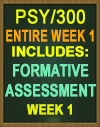
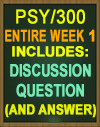

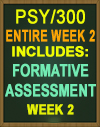
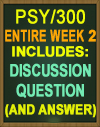

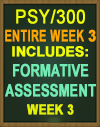
![PSY/300 Week 3 Discussion] PSY/300 Week 3 Discussion](images/PSY300/psy300 week 3 dq.jpg)

